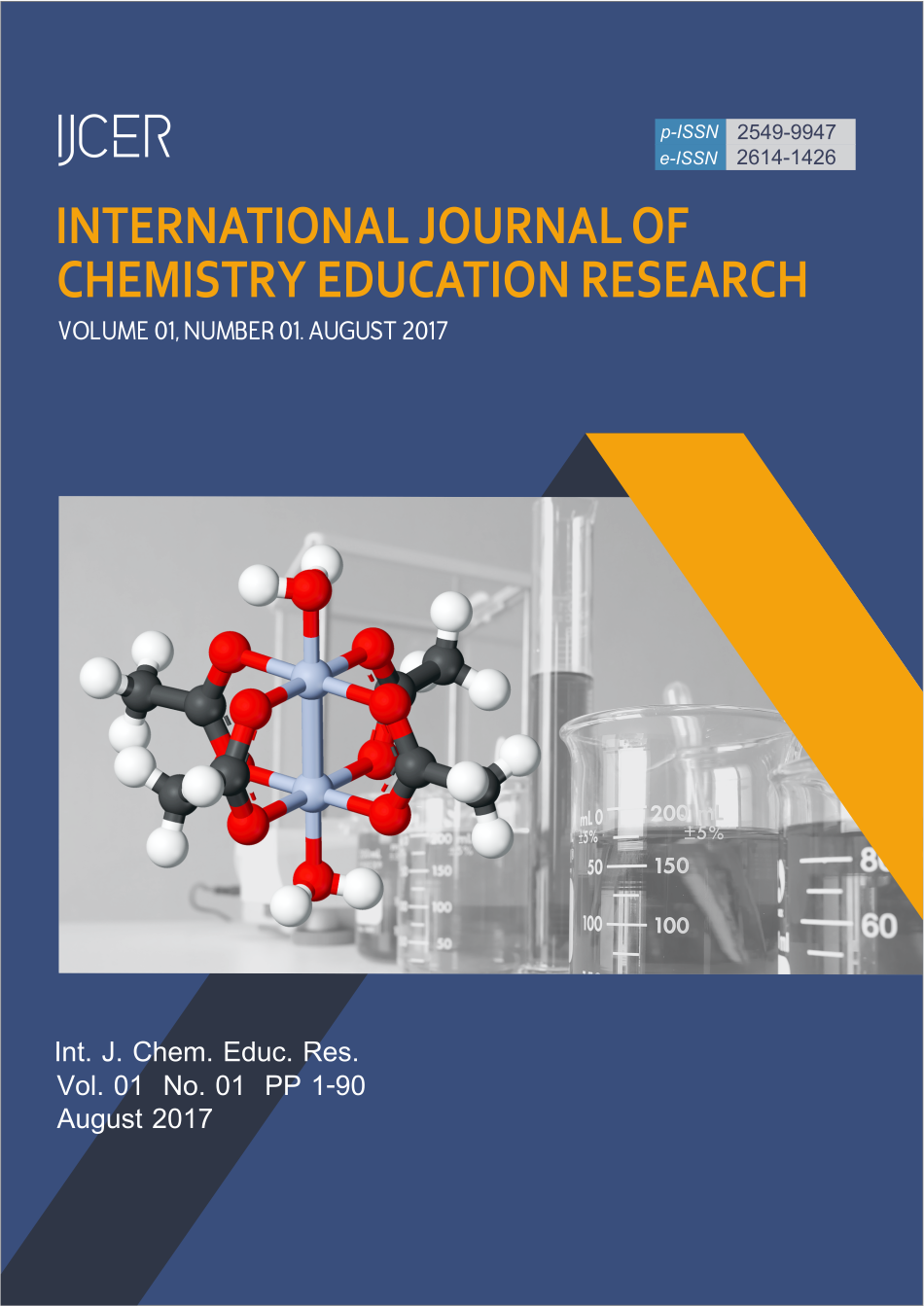Main Article Content
Abstract
ABSTRACT: This study aims to study the application of STAD type cooperative learning in the course of Inorganic Chemistry combined with the use of Molymod props. The purpose of this study is to determine whether there is the influence of the application of STAD strategy and props Molymod to students' understanding on the subject of Inorganic Chemistry. Implementation of learning is done in two cycles, each cycle includes group learning outside the classroom, material confirmation by the lecturer, working on using the worksheet, and quiz. The data obtained were processed to see the development of each group from the value of the worksheet 1 to the worksheet 9. The group's developmental value was also measured using quizzes performed twice individually. Student attitudes toward STAD and Molymod use were measured using a behavioral scale questionnaire. Based on the assessment of group development, almost all groups showed an increase in group progress from worksheet 1 to worksheet 9. However, the group development value between worksheets and quizzes dropped dramatically. There is no influence of student attitude toward STAD strategy with material understanding. However, the use of molymod influences strong enough to the understanding of student materials. As many as 50% of students get a minimum score of B.
Keywords: STAD, cooperative learning, learning outcomes, inorganic chemistry, molymod props
Received: 15 June 2017, Revised: 5 August 2017, Accepted: 1 September 2017
Article Details
Author retain copyright and grant the journal right of first publication with the simultaneously licenced under A Creative Commons Attribution (CC-By-SA) 4.0 License that allows others to share the work with an acknowledgment of the worsk's authorship and initial publication in this journal.
References
- A. M. Sardiman, Interaksi dan Motivasi Belajar (Rajawali Pers, Jakarta, 2011 ).
- N. Asma, Model Pembelajaran Kooperatif (Depdiknas, Jakarta, 2008).
- L. Simatupang and R.S Dewi, JPK, 6, 1, (2014).
- M. P Utomo, E. Widjajanti, and A. K. Prodjosantoso, in: Prosiding Seminar Nasional Penelitian,
- Pendidikan, dan Penerapan MIPA UNY, (FMIPA UNY, Yogyakarta, 2011 ).
- R. E. Slavin, Cooperative Learning Teori, Riset dan Praktik (Nusa Media, Bandung, 2010).
- Rusman, Model-Model Pembelajaran Mengembangkan Profesionalisme Guru (PT Raja Grafindo
- Persada, Jakarta, 2011 ).
- Isjoni, Alfabeta, 3, 96-104 (2010).
- S. Nasution, Dasar-dasar Kurikulum (Bumi Aksara, Jakarta, 2008).
- R. Laura, Ph.D. thesis, Dublin City University, 2016.
- M. Setyarini, Liliasari, A. Kadarohman, and M. A. Martoprawiro, Cakrawala Pendidikan 36, 1, 91 -101
- (2017).
References
A. M. Sardiman, Interaksi dan Motivasi Belajar (Rajawali Pers, Jakarta, 2011 ).
N. Asma, Model Pembelajaran Kooperatif (Depdiknas, Jakarta, 2008).
L. Simatupang and R.S Dewi, JPK, 6, 1, (2014).
M. P Utomo, E. Widjajanti, and A. K. Prodjosantoso, in: Prosiding Seminar Nasional Penelitian,
Pendidikan, dan Penerapan MIPA UNY, (FMIPA UNY, Yogyakarta, 2011 ).
R. E. Slavin, Cooperative Learning Teori, Riset dan Praktik (Nusa Media, Bandung, 2010).
Rusman, Model-Model Pembelajaran Mengembangkan Profesionalisme Guru (PT Raja Grafindo
Persada, Jakarta, 2011 ).
Isjoni, Alfabeta, 3, 96-104 (2010).
S. Nasution, Dasar-dasar Kurikulum (Bumi Aksara, Jakarta, 2008).
R. Laura, Ph.D. thesis, Dublin City University, 2016.
M. Setyarini, Liliasari, A. Kadarohman, and M. A. Martoprawiro, Cakrawala Pendidikan 36, 1, 91 -101
(2017).




